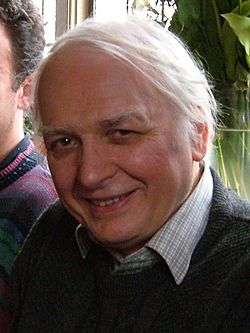Michael Fasham facts for kids
Quick facts for kids
Michael Fasham
|
|
|---|---|

Fasham pictured in 2004
|
|
| Born |
Michael John Robert Fasham
29 May 1942 Edgware, United Kingdom
|
| Died | 7 June 2008 (aged 66) |
| Nationality | British |
| Alma mater |
|
| Awards |
|
| Scientific career | |
| Fields |
|
| Institutions |
|
| Thesis | A statistical analysis of oceanic magnetic anomalies (1968) |
Michael John Robert Fasham (born May 29, 1942 – died June 7, 2008) was a British oceanographer. He was also an expert in creating ecosystem models. He is famous for his early work on models that show how tiny ocean creatures called plankton live and interact.
Contents
Early Life and Education
Michael Fasham was born in 1942 in Edgware, a part of north London. He went to Kilburn Grammar School. Later, he studied at the University of Birmingham. He first earned a degree in physics in 1963. Then, he switched to marine geology for his PhD, which he completed in 1968.
Michael Fasham's Career in Ocean Science
After finishing his PhD, Fasham joined the National Institute of Oceanography (NIO). He stayed with this organization and its later versions throughout his career. At NIO, he helped create one of the first computer systems used on ships.
He also used his skills in statistics to study where plankton live in the ocean. This field was mostly about describing things back then. His work led to many important papers on how plankton are spread out. He also helped develop a special tool called a fluorimeter. This tool could measure phytoplankton chlorophyll during ocean surveys.
Developing Ocean Ecosystem Models
In the 1980s, Fasham started focusing on how energy and materials move through ocean food webs. This research led him and his team to create a very important model of the open ocean plankton ecosystem. This model is sometimes called "FDM" after the first letters of its creators' names.
The FDM model divides the plankton ecosystem into seven parts. These parts include phytoplankton (tiny plants) and zooplankton (tiny animals). It also includes a "microbial loop" which shows how nutrients are recycled. This study is one of the most referenced papers in its field. It won the American Society of Limnology and Oceanography John Martin Award in 2010.
Later, Fasham worked with scientists at Princeton University. Together, they used the ecosystem model in a larger general circulation model of the North Atlantic. This was one of the first times such a model was used in this way. Fasham continued to improve ecosystem models. He looked at things like how to make the models more accurate. He also studied the balance between different types of plankton. He explored how plankton move up and down in the water each day. He also studied the role of iron in the ocean's primary production.
Fasham also played a key role in an international project called the Joint Global Ocean Flux Study (JGOFS). This study ran from 1987 to 2003. He served on both national and international committees for JGOFS. He was even the chairman of the International Committee from 1998 to 2000.
Awards and Honors
Michael Fasham received several important awards for his work. In 2000, he was chosen as a Fellow of the Royal Society (FRS). This is a very high honor for scientists in the UK. In 2002, he received the Challenger Society Medal. This award recognized his important contributions to marine science.
Personal Life
Michael Fasham officially retired in 2002. However, he kept doing research and teaching. He passed away in 2008 after a long illness.


